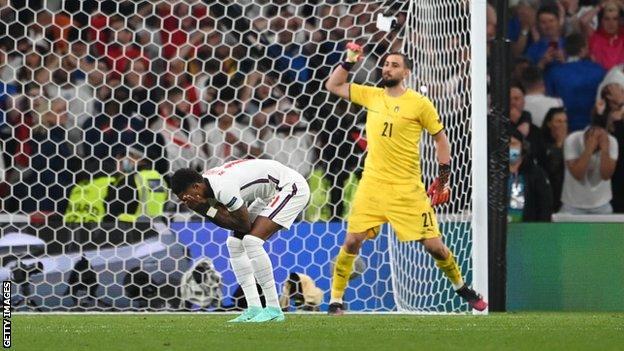

Bringing on a substitute to ‘finish’ a game sounds like a good idea in theory, but there have been some high-profile cases when it has backfired in recent months – and mostly from the penalty spot.
West Ham’s Mark Noble was still wearing his bib when manager David Moyes asked him to take a spot-kick against Manchester United last month before David de Gea saved it.
And in the Euro 2020 final, a debate erupted around England boss Gareth Southgate introducing Marcus Rashford and Jadon Sancho with only minutes remaining in extra time, with both players missing from 12 yards against eventual winners Italy.
Were the players adequately prepared to take such a big part in either match?
In the case of Rashford and Sancho, AFC Wimbledon’s substitution coach Sammy Lander thinks not.
As part of his pitch to Wimbledon boss Mark Robinson, he analysed what players were doing prior to their introduction to England’s biggest game for 55 years.
“I highlighted little bits of the final when Sancho and Rashford came off the bench, and they weren’t warming up down the touchline, they were just walking,” Lander tells BBC Sport.
“I think they were out warming up for about 11 minutes. For about seven of those they were stood still, for about two minutes they were doing groin stretches and then for about one minute they were sort of just sat watching.
“So my immediate thought was that they’re not physically ready to come on into a game of football, not only to match the intensity, but to try and raise it.”
That is where Lander believes he can add value to a sport which already employs restart coaches and throw-in coaches: by getting players, technically, physically and mentally ready to enter the field of play and enhance the team. In short, to turn them into ‘finishers’.
Combating the negative mindset
One of Lander’s key tasks with substitutes at League One Wimbledon is helping them try to combat the negative association with being named on the bench.
“I saw a great picture of Manchester United’s bench the other week and there were six or seven players all slumped over, arms folded, and hoods up,” says Lander, who has been employed at the club on a voluntary trial basis by Robinson.
“One of those guys could be your match-winner, potentially, and look at their body language.
“So it’s about engaging with players throughout the game, asking them questions around maybe what their opposite numbers are doing well or not, and maybe areas that you might be able to exploit, if you were to enter the game.”
The fact that Lander is on the Wimbledon coaching staff is down to Robinson.
He already employs a restarts coach, who helps when the ball goes out of play or a free-kick takes place, and it was the manager’s openness to new ideas which Lander latched on to, even if his boss has “mixed feelings” about the concept.
“It makes the players realise that we are very player focused, and we are trying to improve them, so that’s been the positive behind [having a substitution coach],” Robinson tells BBC Sport.
“I’m a big believer that you have to make people feel valued, but I’m also a big believer that players need to take a big ownership of their own development, so I kind of sit between two stools.
“As a professional, why wouldn’t you be looking at the game or preparing yourself properly? OK, you might be upset that you’re not starting, and that’s no reason not to be fully invested in what you’re going to do, but I do realise that they’re human beings.”

What next – a water bottle coach?
Lander, who has worked as an analyst and scout with Bournemouth, recognises that a role like his can be met with scepticism.
Following a recent interview one of the comments under the online article asked: “What next – a water bottle coach?”
But with Liverpool among the teams employing throw-in coach Thomas Gronnemark, the search for marginal gains seemingly has no end.
Robinson, whose side are 14th in League One, admits making substitutions with a clear head can be “difficult”, but says he takes the initiative by speaking to Lander before half-time to gear a warm-up with a specific objective.
He said: “We’ve all been in a position where you get a sub ready before he stands on the line and you say, ‘go and win the match for me’. But what does that actually mean?”
In Southgate’s case, his hope was that Rashford and Sancho would score from the penalty spot and lead England to glory for the first time since 1966.
But Lander suggests that they could have practiced stroking penalties in Wembley’s warm-up room to get the players’ muscle memory in place, and ensure they were not over-thinking what was to come.
“It’s like if you haven’t driven for a week and that first change of gear isn’t as smooth as if you’d been driving for 100 miles,” Lander says. “It’s the same for football.
“When you make 100 passes the 101st is just instinct, but when you make that first pass I think you’re really thinking about it.”







